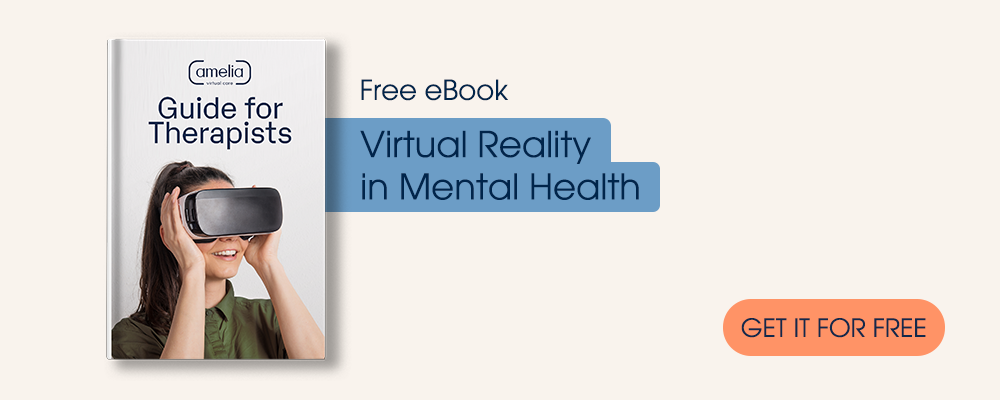Chances are you or someone you know is using some form of remote care. A recent APA survey indicates that over 80% of clinicians are treating patients via teletherapy or telepsychology–whether by phone/telehealth platform alone or in combination with in-person and remote services. Regardless of frequency of use, most therapists agree that remote care is here to stay. Virtual reality (VR) platform Amelia proudly exists to support clinicians and their needs. Since its release in January 2020, our VR smartphone application functionality has proven to be a timely and effective tool to enhance remote experiences for therapists and patients alike.
Amelia makes remote care more engaging for both the client and you, the mental health professional. If you’re already an Amelia member, the access is included in your subscription. See the “How Remote Sessions Work” section just below.
If you’re not a member yet, the smartphone app can be a cost-effective way to enjoy the benefits of VR within your online practice. Be sure to click the “Request More Info” button at the bottom of the article.
How Remote Sessions Work
Where you meet for remote sessions will remain the same. The bigger, better difference? With an active Amelia account, an online connections, a smartphone with the free Amelia app downloaded and a universal mobile VR headset, you’re all set to sync up with virtual reality.
The Amelia app is free to download, and your patient accesses only the VR programs that you send. Decent universal mobile VR headsets to insert an Android or iOS smartphone go for 20-50USD nowadays. You can even consider giving these away when patients sign up for regular remote sessions. Also, this works wonders for both clients who travel a lot and those who seek VR experience from the comfort of home. Talk about added business opportunities for your practice.
Once online together, you and the client can enjoy perfect synchronization with our virtual reality platform in just a few clicks. Many Amelia therapists are already experiencing the effectiveness of VR with the freedom of remote care. As Amelia member, Thomas Fullbrook, PhD LCSW, shares “Amelia has allowed me to take my practice to a new level. Considering how much the pandemic has changed and, in some cases, limited patient interactions, using VR remotely has been such a benefit.”
In the next video, Thomas Fullbrook shares with us how does he use Amelia in your remote sessions:
The Benefits of VR in Remote Sessions
Do the results of VR remote sessions differ from in-person interactions? Not at all! Both in-person and remote sessions let you easily immerse the patient in the VR environment of your choice, including even from the comfort of clients’ own home.
With the Amelia for smartphone app, you can use up to 70 different environments as exposure tools to immerse your patients in more than 20 various situations. Also, the mindfulness and relaxation environments are available for use by your clients as additional tasks between sessions without therapist supervision.
As Amelia members attest, the smartphone app is taking their practice to another level. Whether through necessity or a desire to acquire greater flexibility, therapists realize that there can be more to online sessions than what meets the eye. Tools like the Amelia app offer wider access to VR and, more importantly, boost interactions with your patients.
Many Amelia therapists are already enjoying the real benefits of VR with the freedom of remote sessions. If you’re interested in knowing more about the Amelia remote tool, click the button down below.












